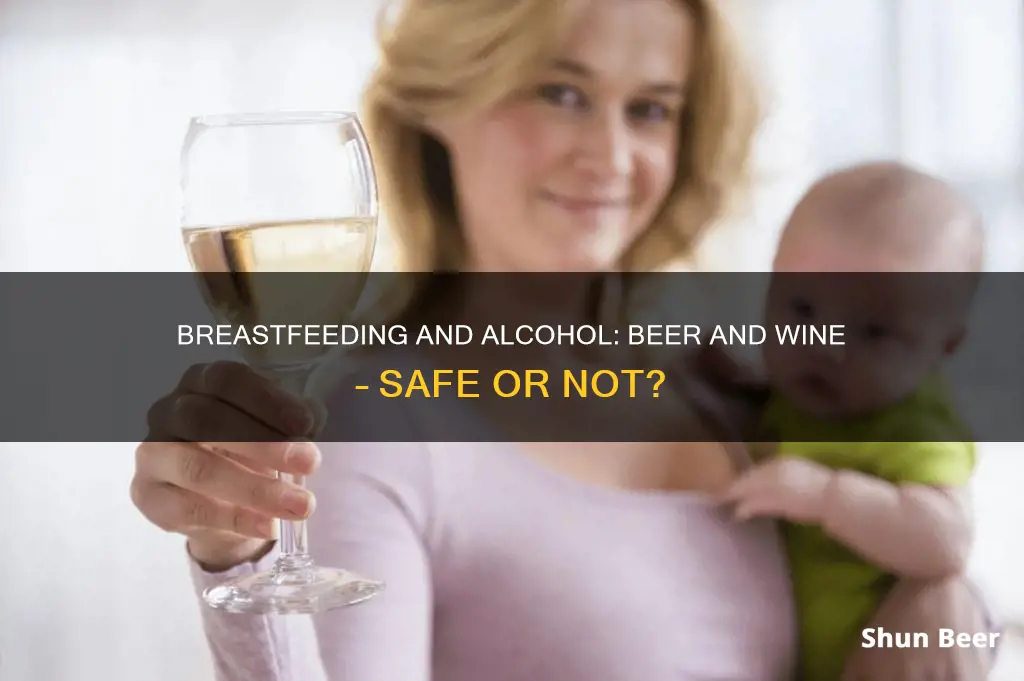
Many new mothers wonder if they can enjoy an alcoholic drink while breastfeeding. The short answer is yes, but in moderation. It is recommended to wait at least two hours after drinking before breastfeeding, as alcohol can pass into breast milk and may negatively affect the baby. One drink a day is generally considered safe, but excessive alcohol consumption can decrease milk supply and cause sleep, growth, and developmental problems in the baby. It is also important to note that newborns metabolize alcohol at about half the rate of adults, so the baby's age should be considered.
| Characteristics | Values |
|---|---|
| Is it safe to drink alcohol while breastfeeding? | Occasional alcohol is considered safe for breastfeeding mothers. However, it is recommended to limit alcohol consumption to one drink per day. |
| How long should you wait after drinking before breastfeeding? | It is advised to wait for at least 2 hours after drinking before breastfeeding. The alcohol content in breast milk decreases as the level of alcohol in the bloodstream drops. |
| Does drinking alcohol affect breast milk production? | Regular alcohol consumption can negatively impact breast milk supply and the let-down reflex, resulting in reduced milk intake for the baby. |
| What are the potential risks to the baby? | Alcohol can cause sleep disturbances, decreased milk intake, impaired weight gain, developmental and neurological issues, and potential harm to the baby's cognitive development. |
| Is "pump and dump" necessary after drinking? | Pumping and dumping does not remove alcohol from breast milk. The alcohol content in milk decreases as the amount of alcohol in the bloodstream reduces. |
What You'll Learn

Occasional vs. regular drinking
Occasional drinking while breastfeeding is generally considered safe, but it's important to practise moderation and allow time for the alcohol to leave your system before nursing. According to sources, one alcoholic drink per day is unlikely to harm your baby, especially if you wait at least two hours after drinking before breastfeeding. This timeframe is supported by the observation that it takes the average adult about two hours to metabolise one drink.
However, regular drinking above the recommended limits can be harmful to both you and your baby. Excessive alcohol consumption can decrease your milk supply and cause sleep, growth, and developmental problems for your baby. To maintain a low level of health risk, it is recommended to not drink more than 14 units of alcohol per week on a regular basis.
If you do drink alcohol, it is important to be aware of the amount you consume and to plan ahead. Breastfeed your baby before drinking, and then wait at least two hours per drink before nursing again. For example, if you have two drinks, wait four to five hours before breastfeeding. This is because the alcohol in your breast milk will mimic the amount in your blood, and it will take longer for the alcohol to leave your system the more you drink.
Stone Cold Steve Austin's Beer of Choice
You may want to see also

Alcohol in breast milk
The amount of alcohol in breast milk closely parallels blood alcohol levels, with the highest levels occurring 30 to 60 minutes after consuming an alcoholic beverage. Food delays the time it takes for alcohol to peak in breast milk. Nursing after one or two drinks can decrease the infant's milk intake by 20 to 23% and cause agitation and poor sleep patterns.
Research has shown that drinking alcohol regularly while breastfeeding may decrease breast milk production and affect how much milk the baby drinks. It can also disrupt the baby's sleep patterns, even after a small to moderate amount of alcohol. Some studies indicate that repeated exposure to alcohol in breast milk could cause long-term harm to nursing babies, but more research is needed in this area.
It is important to note that the more drinks a breastfeeding mother has, the longer it takes for the alcohol to clear her system. Additionally, drinking alcohol on an empty stomach increases the effects of alcohol on the body and can interfere with the oxytocin release necessary for breast milk letdown.
To reduce the baby's exposure to alcohol, it is recommended to breastfeed immediately before consuming an alcoholic beverage and then wait for about three hours before nursing again. If the breasts become full while waiting, the mother can hand express or pump and discard the milk.
In summary, while moderate alcohol consumption (one drink per day) is generally considered safe for breastfeeding mothers, it is important to take precautions to minimize the baby's exposure to alcohol and to avoid negative effects on milk production and the baby's sleep and development.
Beer Chugging: Healthy or Harmful?
You may want to see also

Pumping and dumping
- No Need to Pump and Dump: Alcohol will leave your breast milk as it clears from your bloodstream. Pumping and dumping will not speed up this process. It is not necessary to pump and dump to remove alcohol from your breast milk.
- Timing is Key: If you want to enjoy an alcoholic beverage, it is best to do so right after breastfeeding or pumping. This way, by the time your breasts are full again, the alcohol will have cleared from your system, and you can feed your baby directly.
- Maintain Milk Supply: You may still choose to pump and dump to maintain your milk supply and prevent engorgement, especially if you are skipping a nursing session while drinking. This helps signal to your body to continue producing milk.
- Storing Milk: If you know you will be consuming alcohol, you can pump and store your milk beforehand. This way, you can feed your baby with expressed milk if they get hungry before the alcohol has cleared from your system.
- Alternatives to Pumping and Dumping: Instead of pumping and dumping, you can use alcohol test strips to check if the alcohol has cleared from your breast milk. You can also feed your baby formula during the time when alcohol is present in your milk.
In conclusion, pumping and dumping is not necessary to remove alcohol from your breast milk. It may be considered for comfort or to maintain milk supply, but it is not required for alcohol clearance. Timing your alcoholic drinks and being mindful of the time needed for alcohol to clear from your system are more effective approaches.
Beer and Eliquis: Safe Mix?
You may want to see also

Effects on the baby
While drinking alcohol in moderation while breastfeeding is unlikely to harm your baby, there are still some effects to be aware of.
Firstly, alcohol can cause sleep disturbances in babies, including shorter sleep periods, more frequent wakefulness, and less total active and REM sleep. One study showed that babies slept about 25% less after taking in breast milk that contained alcohol. Increased REM sleep can also occur in the period from 3.5 hours to 24 hours after exposure to alcohol.
Secondly, alcohol can decrease milk intake by the baby and impair the milk ejection reflex in the mother. Nursing after 1 or 2 drinks can decrease the infant's milk intake by 20 to 23%.
Thirdly, alcohol can potentially affect the baby's weight gain. Regular exposure to alcohol in breast milk can cause abnormal weight gain, and heavy drinking may lead to fluid retention in the baby.
Additionally, alcohol consumption by the mother can delay the baby's motor and cognitive development and potentially impair their immune function. One study found that infants exposed to larger amounts of alcohol showed reduced abstract reasoning ability at 6 to 7 years of age.
It is important to note that the effects of alcohol on the baby depend on the amount consumed by the mother, the timing of breastfeeding after alcohol consumption, and the baby's age and weight. Newborns metabolize alcohol at about half the rate of adults, and the more alcohol consumed, the longer it takes for it to clear the mother's system.
Beer and Boils: Is There a Connection?
You may want to see also

Effects on the mother
Drinking alcohol while breastfeeding can have several effects on the mother. Firstly, it can impact the mother's milk supply and ejection reflex. Alcohol inhibits the release of oxytocin, a hormone necessary for the milk ejection reflex, which can result in a decreased milk supply and the baby consuming less milk. This can have a negative impact on the baby's nutrition and growth.
Secondly, alcohol consumption can affect the mother's reaction time and ability to care for the baby. It is important for mothers to be alert and responsive to their baby's needs, and alcohol can impair their judgment and ability to safely care for their infant. This is especially important if bed-sharing or co-sleeping with the baby, as drinking alcohol increases the risk of Sudden Infant Death Syndrome (SIDS).
Additionally, drinking alcohol can have an impact on the mother's overall health and well-being. Excessive alcohol consumption is associated with known health risks, and regular drinking above recommended limits can be harmful. It is important for mothers to monitor their alcohol intake and seek professional help if they feel their consumption is interfering with their ability to breastfeed or care for their child.
To minimise the effects of alcohol on both the mother and the baby, it is recommended that mothers wait at least two hours after drinking before breastfeeding or expressing milk. This allows the alcohol to metabolise and leave the breast milk, ensuring that the baby is not exposed to harmful levels of alcohol.
Drinking Beer and Donating Blood: Is It Safe?
You may want to see also
Frequently asked questions
Yes, but only in moderation. The American Academy of Pediatrics recommends avoiding alcohol while breastfeeding, but having one drink a day has not been found to be harmful to a nursing baby.
It takes around two hours for the average adult to metabolize one drink, so it's best to wait at least two hours after drinking before breastfeeding.
Yes, the more alcohol in the drink, the longer it will take for the alcohol to leave your system. One standard drink is 12 oz. of 5% ABV beer, 8 oz. of 7% ABV malt liquor, 5 oz. of 12% ABV wine, or 1.5 oz. of 40% ABV liquor.
Drinking alcohol while breastfeeding can decrease your milk supply and affect your let-down reflex. It can also cause sleep, growth, and developmental problems in your baby.







